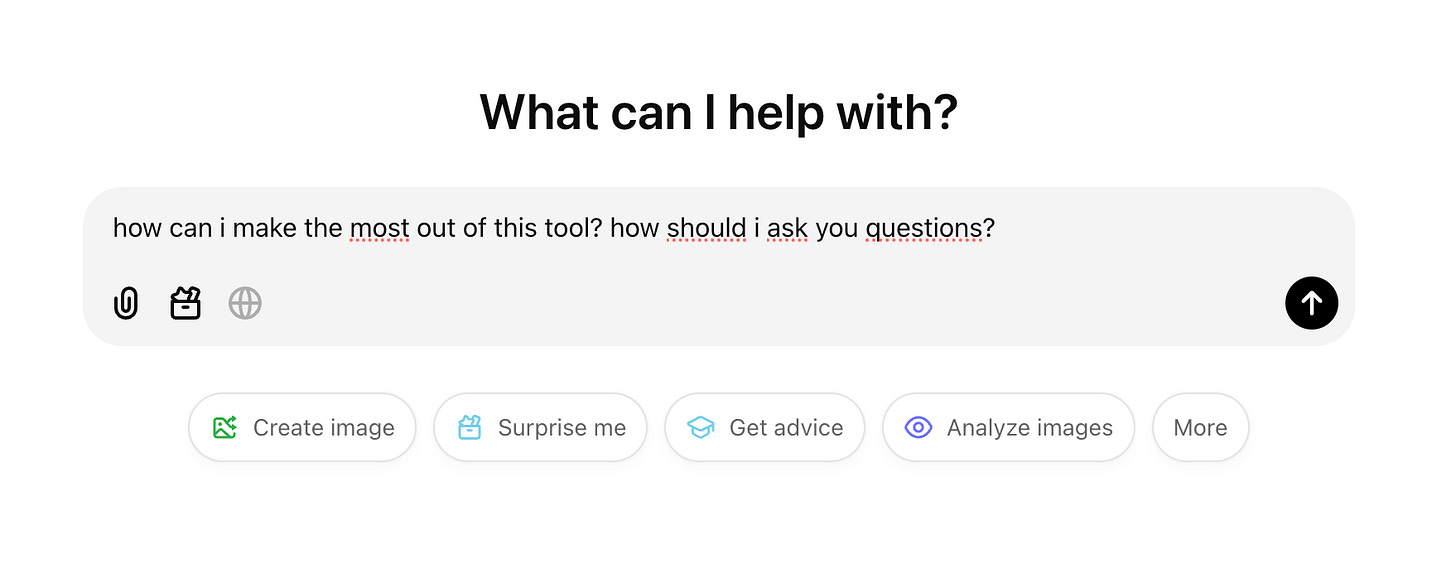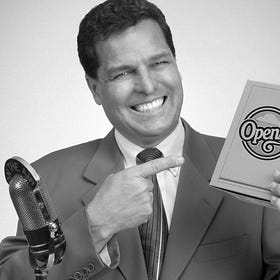ask better questions
it's not AI's fault, you just don't know how to ask
I’ve always been in between worlds: the posh and the hippies, the corporate and the arts, the routine and the boheme, the ranters and the doers. And I find myself again in between two worlds: the ones who have integrated AI so seamlessly into their lives that they see it as just another tool, and those who don’t know how to use it (yet they have the need to talk about it).
It’s funny (not really) but often when talking to that latter group I have heard a similar comment:
I tried using ChatGPT for ___insert stupid task here___ and it was useless.
I have just came to learn that I should keep advice to myself unless it is requested, so I generally stay silent when I hear variations of the sentence above. However, my brain is free to whisper and everytime someone starts sharing their frustrations with a tool they have only used for (at most) 10 minutes, my mind is screaming:
YOU HAVE TO ASK BETTER QUESTIONS
This is not about having done a course on how to use ChatGPT or not, this is about asking good questions.
In fact, asking good questions is the main skill to success on most professions. Take a doctor for example. A “bad” doctor will ask you where it hurts and prescribe you medication for that - so if you arrive with pain on the back, you might leave with just some antiinflammatory pills. A “good” doctor will instead ask better questions to see if there is an underlying cause to your back pain. I remember when SIBO, IBS and all sorts of intestinal disorders became “popular” diseases (if you can call it that). I followed trends for a while so I also started to have symptoms - and so I went to my GP, who started to ask questions:
- do you go to the psychologist? (god, yes I do but why do you even care, I am here about my gut not about my mental health)
- have you been stressed lately? (yes, and who hasn’t? Actually you are making my stress worse by deviating from the reason why I came here on the first place)
- so are you taking anxiety medication (no but I’m going to need it if you don’t stop this)
- and what does your therapist say about it? (aaaaaaaaaah, well, that’s true, I remember she said I should take it… Wait! Could this be related?)
- it seems likely that your gastrointestinal problems are influenced by dysregulation in the gut-brain axis, where anxiety can disrupt gut function and cause discomfort. I’m prescribing anxiety medication to regulate serotonin, a key neurotransmitter for both mood and gut health. This should help improve your mental health and restore balance to your gut, addressing both problems together.
I took it, I fixed it. It worked. She is a good doctor, or in other words: not a rushed one, who is not scared of asking better questions.
But enough about my health and back to the reason why I suspect you’re here: how to ask better questions?
Start by don’t asking bad questions
You are invited to a friend’s party. You don’t know anyone. I can already predict what’s going to happen. Or at least how it’s going to start:
From there it can go two ways:
You either enter the never infinite loop of curiosity that will lead to real connection and fun or you enter the most common cycle of basic-ness, commonly renamed as networking.
But now for real, there is not such a thing as “bad” questions, there is rushed questions, unnecessary questions, untimely questions, empty questions. And when it comes to AI, I think there is many poorely framed questions under the assumption that ChatGPT is a magician.
🔮🪄✨ It’s all marketing’s fault ✨🪄🔮
I won’t deny there’s some witchcrafting involved in today’s Generative AI. It’s already Unexplainable, Unpredictable, Uncontrollable.
Any sufficiently advanced technology is indistinguishable from magic.
Arthur C. Clarke.
Dear Arthur, I am still not sure how I stand in regards to this, but my family for sure thinks it is magic. And so does marketing. Really: what is it with the sparkles ✨, the wands 🪄 and the oracles 🔮? Someone branded their “AI powered tool” as magic, then everyone else followed.
And so the world thinks that you can just ask whatever shitty question to ChatGPT and expect a “good” answer.
I tried using ChatGPT for ___insert a task that takes effort here___ and it was useless.
Oh well, do I really need to explain it?
it’s no different from a regular conversation
Okay, yes, ChatGPT is tech and you should not forget that while interacting with it. Last thing I want here is for you to fall in love with whatever version of Samantha you’ve got. But really, the rules on how to get the answer you need don’t wander far from the dynamics of a regular conversation.
1 - it’s all about empathy
At the core of any type of great communication, we will always find empathy. Which, on this Human To Machine interaction, would translate to YOU (human), understanding how MACHINE (AI) is built. For example, understanding that ChatGPT works based on probabilities or that is trained with data from up to december 2023. So the answer to your question, might not always be what you’re looking for, but the words and sentences with the best calculated probability according to an algorithm that is most likely not using last years data.
2 - the right answer takes time
How many times you’re talking to someone and you find yourself asking them variations of the same question until they finally get it? It’s no different here. Experiment with prompts, refine, and explore different angles. You might need to ask many times plus follow-up questions to get where you want to go. And that’s ok.
3 - question everything
If you don’t take your mother seriously, why would you take genAI responses as truth?
4 - this is a two-way street
Remember: the moment you ask a question, you’ve opened a dialogue, an invitation to conversation, which is in the end, a two-way street. So the next time you get a wrong answer ask yourself if it could also be due to your wrong questioning.
comment:
I’d be curious to know:
how is your relationship with ChatGPT?
what are some prompts that you find useful?
3 references:
📖 one read: ✨every app that adds AI looks like this✨ by Alex Dobrenko
📊 one infographic: The daily scroll of the average social media user visualized is almost 100 meters. Scary. Mine is probably more than that
🎧 one listen: My friend Karim’s podcast on Why Responsible AI needs Philosophy with tech philosopher Louis de Diesbach
read my latest post:
You All Smell Like ChatGPT Content
And I probably do sometimes too, don't get me wrong and don't take this personal. But I think it's time we admit that Gen AI written content is very noticeable and that we have to learn where and how is ok to use it. Otherwise the internet is going to become uninhabitable.








Loved the conversational tone of this piece! It’s refreshing to read about AI in no-BS plain English. I liked your observation about AI tools being widely branded as ‘magic’. It’s a double-edged sword to position them that way, and you’re right that they are likely to be misunderstood as a result. I agree that the real AI wizards are masters at prodding. Another example I can add here: graphic designers who’ve embraced Adobe Firefly.
Carmen you didn’t have to call me out like that!!! I’m awful at asking questions, but I improved a lot with age, which might just be the reason why this was such a relatable and enjoyable read